高中英语语法之情态动词
高中英语语法复习之情态动词虚拟语气
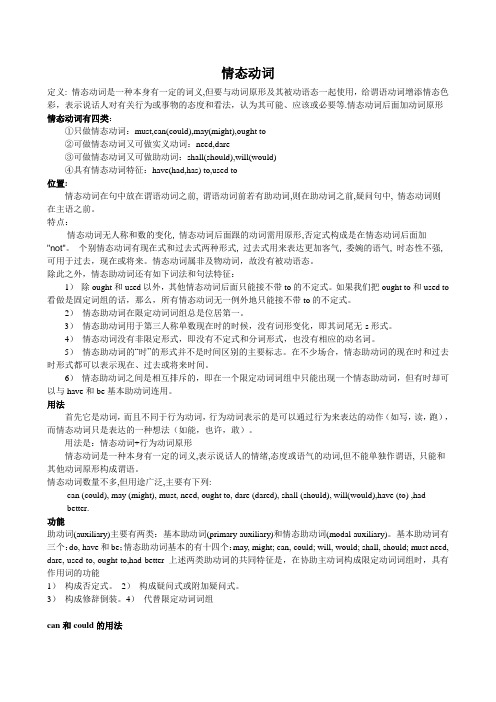
情态动词定义: 情态动词是一种本身有一定的词义,但要与动词原形及其被动语态一起使用,给谓语动词增添情态色彩,表示说话人对有关行为或事物的态度和看法,认为其可能、应该或必要等.情态动词后面加动词原形情态动词有四类:①只做情态动词:must,can(could),may(might),ought to②可做情态动词又可做实义动词:need,dare③可做情态动词又可做助动词:shall(should),will(would)④具有情态动词特征:have(had,has) to,used to位置:情态动词在句中放在谓语动词之前, 谓语动词前若有助动词,则在助动词之前,疑问句中, 情态动词则在主语之前。
特点:情态动词无人称和数的变化, 情态动词后面跟的动词需用原形,否定式构成是在情态动词后面加"not"。
个别情态动词有现在式和过去式两种形式, 过去式用来表达更加客气, 委婉的语气, 时态性不强, 可用于过去,现在或将来。
情态动词属非及物动词,故没有被动语态。
除此之外,情态助动词还有如下词法和句法特征:1)除ought和used以外,其他情态动词后面只能接不带to的不定式。
如果我们把ought to和used to 看做是固定词组的话,那么,所有情态动词无一例外地只能接不带to的不定式。
2)情态助动词在限定动词词组总是位居第一。
3)情态助动词用于第三人称单数现在时的时候,没有词形变化,即其词尾无-s形式。
4)情态动词没有非限定形式,即没有不定式和分词形式,也没有相应的动名词。
5)情态助动词的“时”的形式并不是时间区别的主要标志。
在不少场合,情态助动词的现在时和过去时形式都可以表示现在、过去或将来时间。
6)情态助动词之间是相互排斥的,即在一个限定动词词组中只能出现一个情态助动词,但有时却可以与have和be基本助动词连用。
用法首先它是动词,而且不同于行为动词,行为动词表示的是可以通过行为来表达的动作(如写,读,跑),而情态动词只是表达的一种想法(如能,也许,敢)。
高中英语语法情态动词与虚拟语气讲解

高中英语语法情态动词与虚拟语气讲解情态动词的基本用法情态动词具有一定的词义,没有人称和数的变化,必须和其他动词一起构成谓语,用来表示愿望、态度或推测等。
1.表示能力(2)表示将来的能力:will be able to(3)表示过去的能力I can't promise anything, but I'll do what I can.我不能许诺什么,但我会尽力而为。
(表示现在的能力)The fire spread through the hotel very quickly but everyone was able to get out.尽管这场大火迅速蔓延到了这个宾馆,但是每个人都逃了出去。
(表示过去有能力做并且成功地做了)I could have worked out the problem, but I was too nervous.我本来可以解出这道题,但我太紧张了。
(表示本来有能力做但未做)2.表示推测(可能性)可能性可分为客观的可能性和具体事情实际发生的可能性两种。
(1)客观的可能性并不表示具体某事是否会发生,而用来说明人或事物的特征。
情态动词can可用于肯定句中表示客观的(或理论的)可能性,而表示具体事情实际发生的可能性时, can 一般不用于肯定句。
Accidents can happen on such rainy days.在这样的多雨天气里可能会发生事故。
(表示客观的可能性)We may go to the cinema tonight, but we are not sure yet.今晚我们可能去看电影,但还没确定。
(表示实际可能性,不用can)(2)表示具体事情实际发生的可能性表示具体事情实际发生的可能性的层次(由强及弱)比较:①在肯定句中表示推测(must/have to, should/ought to, may, might, could)a.当说话者表达怀疑或犹豫之意时,需用may, might或could, 其中might, could比may所表达的怀疑或犹豫之意更强。
高中英语语法系列情态动词
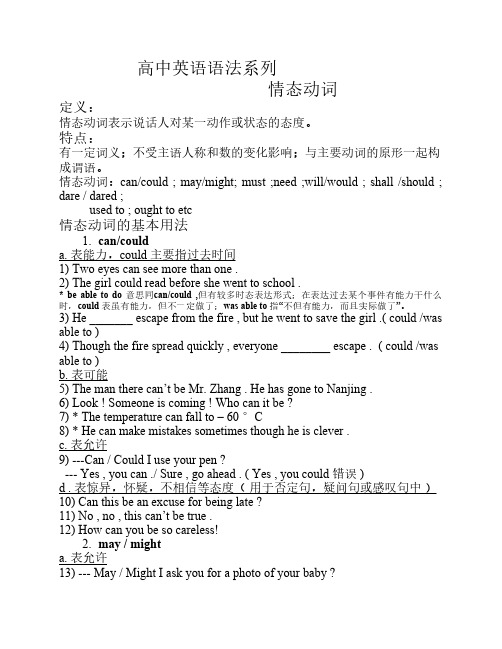
高中英语语法系列情态动词定义:情态动词表示说话人对某一动作或状态的态度。
特点:有一定词义;不受主语人称和数的变化影响;与主要动词的原形一起构成谓语。
情态动词:can/could ; may/might; must ;need ;will/would ; shall /should ; dare / dared ;used to ; ought to etc情态动词的基本用法1. can/coulda. 表能力,could 主要指过去时间1) Two eyes can see more than one .2) The girl could read before she went to school .* be able to do 意思同can/could ,但有较多时态表达形式;在表达过去某个事件有能力干什么时,could 表虽有能力,但不一定做了;was able to 指“不但有能力,而且实际做了”。
3) He _______ escape from the fire , but he went to save the girl .( could /was able to )4) Though the fire spread quickly , everyone ________ escape . ( could /was able to )b. 表可能5) The man there can’t be Mr. Zhang . He has gone to Nanjing .6) Look ! Someone is coming ! Who can it be ?7) * The temperature can fall to – 60 °C8) * He can make mistakes sometimes though he is clever .c. 表允许9) ---Can / Could I use your pen ?--- Yes , you can ./ Sure , go ahead . ( Yes , you could 错误 )d . 表惊异,怀疑,不相信等态度(用于否定句,疑问句或感叹句中)10) Can this be an excuse for being late ?11) No , no , this can’t be true .12) How can you be so careless!2. may / mighta. 表允许13) --- May / Might I ask you for a photo of your baby ?--- Yes , please . / Certainly ./ Please don’t ./ You’d better not ./ No , you mustn’t.b. 表可能,might 语气更加不肯定14) She may be at home .15) She might come to the party , but I am not sure .c .祝愿16) May you succeed !3 . musta . 表义务,意为“必须”,主观意志;而have to 为“不得不”,客观要求。
高中英语语法讲义-情态动词
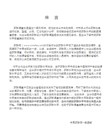
He may [might] be writing a letter. 他可能在写信。
They may [might] be going abroad next month. 他们可能在下个月出国。
③ 后接动词完成式,表示对过去可能发生的事进行推测:
另外,could还可与表示感知的动词(如see, hear, smell, taste, feel, understand等)连用表示的特定能力:
Looking down from the plane, we could see lights on the runway. 从飞机上向下看,我们可以看见机场跑道上的点点灯火。
2) 表示委婉的批评或责备:
You might have made greater progress. 你的进步本来可更大一些的。
You might at least have answered my letter. 你至少可以回我一封信嘛。
③ 表示“差点儿就要”:
I could have died laughing. 我差点儿笑死了。
二、may与might的用法
1. 表示允许
注意以下两种情况:
(1) 表示请求允许(即请求别人允许自己做某事),两者都可用,只是 might 表示的语气较委婉(但并不表示过去):
May [Might] I sit here? 我可以坐在这里吗?
1) 表示过去某事可能发生而实际上却并没发生:
A lot of men died who might have been saved.很多人本来可以获救的却死了。
It was really very dangerous. I might have killed myself. 那真的是太危险了,我差点没命了。
语法 Modal Verbs情态动词 课件 2021-2022学年高中英语人教新课标必修三

I commanded that you (should) go to the front immediately.
重点语 法规则!
宾语从句
从句的谓语:should+动词 原形,其中should可以省略
虚拟语气
常见的,后接宾从要用虚拟语气的动词还有:
四个“要求”:request, require, demand, desire
Your parents will try their best to help you. 你的父母会尽最大努力帮助你。
用法:
① 表示义务、必要或命令 : You must come early tomorrow.
② 表示推测“肯定,一定”: They must be at home. The light is on.
Tom can swim. =Tom is able to swim.
汤姆会游泳。
can
(could)
(疑问句中)表示 请求
可以 Could you give us a hand?
你可以帮我们一下吗?
(否定句、疑问 句中)表示可能 性
The boy can’t be Jim. He’s can可能 much taller.
2. 实义V.
肯:dare to do 否:don't dare to do
e.g.: I dare to swim . He doesn’t dare to swim.
1. You ____to the meeting this afternoon .
A needn’t to come
B don’t need come
need 需要,有必要
1. 情态V, 肯:need do 否:needn't do
英语语法: 情 态 动 词
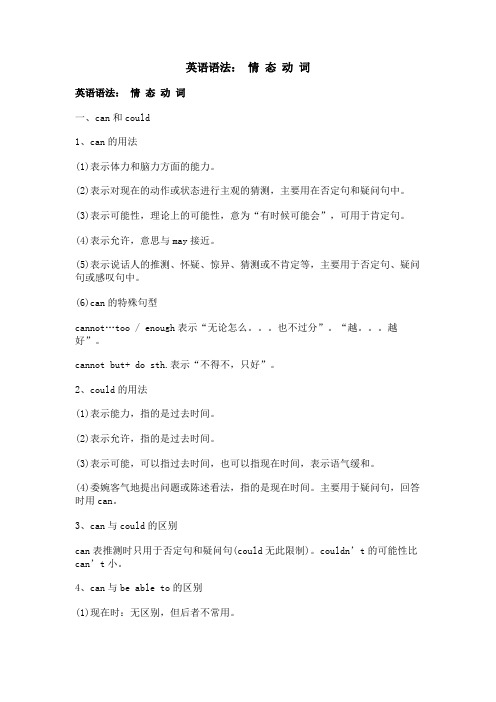
英语语法:情态动词英语语法:情态动词一、can和could1、can的用法(1)表示体力和脑力方面的能力。
(2)表示对现在的动作或状态进行主观的猜测,主要用在否定句和疑问句中。
(3)表示可能性,理论上的可能性,意为“有时候可能会”,可用于肯定句。
(4)表示允许,意思与may接近。
(5)表示说话人的推测、怀疑、惊异、猜测或不肯定等,主要用于否定句、疑问句或感叹句中。
(6)can的特殊句型cannot…too / enough表示“无论怎么。
也不过分”。
“越。
越好”。
cannot but+ do sth.表示“不得不,只好”。
2、could的用法(1)表示能力,指的是过去时间。
(2)表示允许,指的是过去时间。
(3)表示可能,可以指过去时间,也可以指现在时间,表示语气缓和。
(4)委婉客气地提出问题或陈述看法,指的是现在时间。
主要用于疑问句,回答时用can。
3、can与could的区别can表推测时只用于否定句和疑问句(could无此限制)。
couldn’t的可能性比can’t小。
4、can与be able to的区别(1)现在时:无区别,但后者不常用。
(2)完成时;can没有完成时,此时要用have(has,had)been able to。
(3)将来时:can没有将来时,要用will be able to。
(4)过去时:could表示一般能力,was/were able to 表示在具体场合通过努力成功做成某事的能力。
二、may 和might1、may的用法(1)表示询问或说明一件事可不可以做。
(2)表示一件事或许会发生或某种情况可能会存在,通常用在肯定句和否定句中。
注意:表示可能性时,can’t语气强,表示“不可能”,may not语气弱,表示“可能不”。
2、might的用法(1)表示询问或允许,指的是过去时间。
(2)表示可能发生的事,可以指过去时间,也可以指现在时间,语气更加不肯定,可能性比may小一些。
高中英语语法讲解: 情态动词

高中英语语法讲解:情态动词概述1.共有10个情态动词:can/could, may/might, will/would, shall, should, ought to, must;2个半情态动词need, dare2.特点:(1)情态动词后加动词原形(即不带to的不定式)一起构成谓语;(2)没有人称和数的变化;(3)多数情态动词有过去式,但其过去式有时并不表示时态,而只起“委婉或不确定语气”的作用。
Would you do me a favour? She may/might be watering the flowers now.3.情态动词在句子中可发挥不同作用,如表能力,表责任与义务,表推测,表征求允许,表请求,表建议,表语气态度等等He can/could run 100 meters in 11 seconds.You should/ought to/must work hard to win a gold medal.Can/Could/May/Might I watch the Olympics tonight?Will/Can/Could/Would you help me with my training?He might/may/could/should/ought to/will/must watch the football match tonight.I suggest that you should watch the opening ceremony.Can this be true?4.情态动词+do 表对一般现在或将来情况的推测情态动词+ be doing 表对正在发生的事情的推测情态动词+have done 表对过去已经发生的事情的推测一、can/could 的用法1.表能力(1) can do现在一般的能力(2) could do过去一般的能力(3) could have done过去有能力做但没做具体某事(4)was/were able to do = managed to do/ succeeded in doing 过去有能力做且做了具体某事。
高中英语语法专题情态动词与常考短语
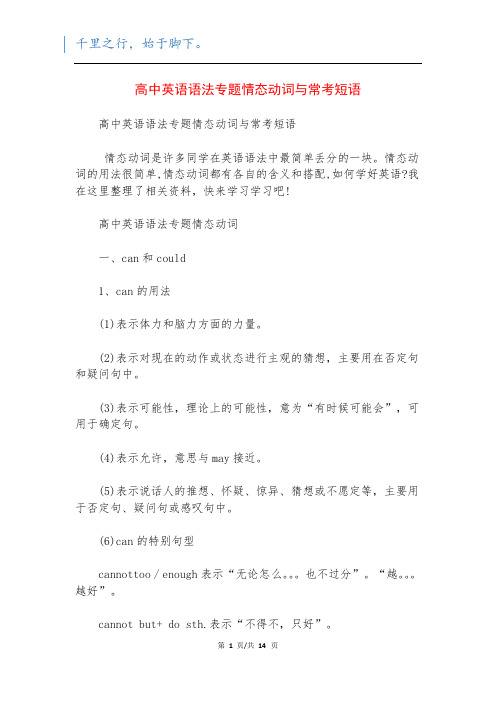
高中英语语法专题情态动词与常考短语高中英语语法专题情态动词与常考短语情态动词是许多同学在英语语法中最简单丢分的一块。
情态动词的用法很简单,情态动词都有各自的含义和搭配,如何学好英语?我在这里整理了相关资料,快来学习学习吧!高中英语语法专题情态动词一、can和could1、can的用法(1)表示体力和脑力方面的力量。
(2)表示对现在的动作或状态进行主观的猜想,主要用在否定句和疑问句中。
(3)表示可能性,理论上的可能性,意为“有时候可能会”,可用于确定句。
(4)表示允许,意思与may接近。
(5)表示说话人的推想、怀疑、惊异、猜想或不愿定等,主要用于否定句、疑问句或感叹句中。
(6)can的特别句型cannottoo / enough表示“无论怎么。
也不过分”。
“越。
越好”。
cannot but+ do sth.表示“不得不,只好”。
2、could的用法(1)表示力量,指的是过去时间。
(2)表示允许,指的是过去时间。
(3)表示可能,可以指过去时间,也可以指现在时间,表示语气缓和。
(4)委婉客气地提出问题或陈述看法,指的是现在时间。
主要用于疑问句,回答时用can。
3、can与could的区分can表推想时只用于否定句和疑问句(could无此限制)。
couldnt 的可能性比cant小。
4、can与be able to的区分(1)现在时:无区分,但后者不常用。
(2)完成时;can没有完成时,此时要用have(has,had)been able to。
(3)将来时:can没有将来时,要用will be able to。
(4)过去时:could表示一般力量,was/were able to 表示在详细场合通过努力胜利做成某事的力量。
二、may 和might1、may的用法(1)表示询问或说明一件事可不行以做。
(2)表示一件事或许会发生或某种状况可能会存在,通常用在确定句和否定句中。
留意:表示可能性时,cant语气强,表示“不行能”,may not 语气弱,表示“可能不”。
高中英语语法——情态动词总结(附带练习)

情态动词总结I 情态动词的特征:1.本身有词义。
2.不能独立作谓语。
2. 后接动词原形一起构成谓语。
3. 不随人称和数的变化。
II 情态动词各自的基本意义及用法:1.大多数情态动词(除表‘能力、许可、意志’外),都可以表示推测,其程度有差异。
按可能性程度的高低排列为:must﹥will ﹥would ﹥ought to ﹥should完全肯定完全可能很可能﹥can ﹥could﹥may ﹥might可能有可能2. 区分情态动词的否定含义:may not或许不、可能不might not可能不can’t 不可能mustn’t不许、禁止shouldn’t不应该needn’t 不必1.情态动词表推测的反意疑问句,简单来说,就是以情态动词后的时态为淮,如句子里有明确的时间状语,则以其为准。
2.以must 为例:E.g. 1. You must be hungry now, aren’t you?2. He must be watching TV , isn’t he ?3 Tom must have lived her for a long time, hasn’t he ?4. She must have arrived yesterday, didn’t she?注:如选择题中(以She must have arrived yesterday, didn’t she?为例)既有didn’t she又有hasn’t she则以didn’t she?为最佳答案。
IV 情态动词专项练习与解析一( ) 1. You _____ return the book now. You can keep it till next week if you like.A. can’tB. mustn’tC. needn’tD. may not( ) 2. Where is my pen? I _____ it.A. might loseB. would have lostC. should have lostD. must have lost( ) 3. I wish I _____ you yesterday.A. seenB. did seeC. had seenD. were to see( ) 4. I didn’t hear the phone. I _____ asleep.A. must beB. must have beenC. should beD. should have been( ) 5. If my lawyer _____ here last Saturday, he _____ me from going.A. had been; would have preventedB. had been; would preventC. were; would preventD. were; would have prevented( ) 6. He _____ you more help, even though he was very busy.A. might have givenB. might haveC. may have givenD. may give( ) 7. If it _____ for the snow, we _____ the mountain yesterday.A. were not; could have climbedB. were not; could climbC. had not been; could have climbedD. had not been; could climb( ) 8. Without electricity human life _____ quite difficult today.A. isB. will beC. would have beenD. would be( ) 9. A computer _____ think for itself, it must be told what to do.A. can’tB. couldn’tC. may notD. might not( ) 10. Jenny _____ have kept her word. I wonder why she changed her mind.A. mustB. shouldC. needD. would( )11. We _____ last night, but we went to the concert instead.A. must have studiedB. might studyC. should have studiedD. would study( ) 12. — Could I borrow your dictionary?— Yes, of course you _____.A. mightB. willC. canD. should( ) 13. Tom ought not to _____ me your secret, but he meant no harm.A. have toldB. tellC. be tellingD. having told ( ) 14. — If he _____, he _____ that food.— Luckily he was sent to the hospital immediately.A. was warned; would not takeB. had been warned; would not have takenC. would be warned; had not takenD. would have been warned; had not taken ( ) 15. Peter _____ come with us tonig ht, but he isn’t very sure yet.A. mustB. mayC. canD. will( ) 16. I told Sally how to get here, but perhaps I _____ for her.A. had to write it outB. must have written it outC. should have written it outD. ought to write it out( ) 17. I didn’t see your sister at the meeting. If she _____, she would have met my brother.A. has comeB. did comeC. cameD. had come ( ) 18. — Shall I tell John about it?—No, you _____. I’ve told him already.A. needn’tB. wouldn’tC. mustn’tD. shouldn’t ( ) 19. When a pencil is partly in a glass of water, it looks as if it _____.A. breaksB. has brokenC. were brokenD. had been broken( ) 20. It’s nearly seven o’clock. Jack _____ be here at any moment.A. mustB. needC. shouldD. can( ) 21.— There were already five people in the car but they managed to take me as well.— It _____ a comfortable journey.A. can’t beB. shouldn’t beC. mustn’t have beenD. couldn’t have been ( ) 22. Johnny, you _____ play with the knife, you _____ hurt yourself.A. won’t; can’tB. mustn’t; mayC. shouldn’t; mustD. can’t; shouldn’t ( ) 23. The fire spread through the hotel very quickly but everyone _____ get out.A. had toB. wouldC. couldD. was able to ( ) 24. — When can I come for the photos? I need them tomorrow afternoon.— They _____ be ready by 12:00.A. canB. shouldC. mightD. need( ) 25. — I stayed at a hotel while in New York.— Oh, did you? You _____ with Barbara.A. could have stayedB. could stayC. would stayD. must have stayed ( ) 26. — Will you stay for lunch?— Sorry, _____. My brother is coming to see me.A. I mustn’tB. I can’tC. I needn’tD. I won’t( ) 27. — Are you coming to Jeff’s party?—I’m not sure. I _____ go to the concert instead.A. mustB. wouldC. shouldD. might( ) 28. — Write to me when you get home.— _____.A. I mustB. I shouldC. I willD. I can( ) 29. I was really anxious about you, you _____ home without a word.A. mustn’t leaveB. shouldn’t have leftC. couldn’t have leftD. needn’t leave( ) 30. — Is John coming by train?— He should, but he _____ not. He likes driving his car.A. mustB. canC. needD. may专项练习(二)1. I didn’t see her in the meeting room this morning. She _____ at the meeting.A. mustn’t have spokenB. shouldn’t have spokenC. needn’t have spokenD. couldn’t have spoken2. One ought _____ for what one hasn’t done.A. not to be punishedB. to not be punishedC. to not punishedD. not be punished3. If you really want yourself to be in good health, you must ___ always ___ so much.A. not; be smokingB. not; have smokedC. not; to smokeD. be not; smoking4. With so much work on hand, you _____ to see the game last night.A. mustn’t goB. shouldn’t goC. couldn’t have goneD. shouldn’t have gone5. Most of the students felt rather disappointed at the English party. They say that it ______ better organized.A. had beenB. had to beC. must have beenD. could have been6. I’m surprised that he _____ in the exam.A. should failB. would have failedC. may have failedD. should have failed7. The little girl _____ there alone.A. not dare goB. dares not goC. dare not goD. dare not to go8. “Must we do it now?” “No, you _____.”A. won’tB. needn’tC. can’tD. don’t9. He said he would rather not _____ it right now.A. doingB. to doC. doD. to be doing10. You _____ to the meeting this afternoon if you have something important to do.A. needn’t to comeB. don’t need comeC. don’t need comingD. needn’t come11. Put on more clothes. You _____ be feeling cold with only a shirt on.A. canB. couldC. wouldD. must12. I _____ play football than baseball.A. would ratherB. had betterC. like betterD. prefer13. I thought you _____ like something to read, so I have brought you some books.A. mayB. mightC. couldD. must14. There was plenty of times. She _____.A. mustn’t have hurriedB. couldn’t have hurriedC. must not hurryD. needn’t have hurried15. The plant is dead. I _____ it more water.A. will giveB. would have givenC. must giveD. should have given16. You _____ return the book now. You can keep it till next week if you like.A. can’tB. mustn’tC. needn’tD. may not17. It’s still early, you _____.A. mustn’t hurryB. wouldn’t hurryC. may not hurryD. don’t have to hurry18. Please open the window, _____?A. can’t youB. aren’t youC. do youD. will you19. We _____ for her because she never came.A. mustn’t have waitedB. shouldn’t have waitedC. mustn’t waitD. needn’t wait20. — May I stop here? — No, you _____.A. mustn’tB. might notC. needn’tD. won’t21. It’s a fine day. Let’s go fishing, _____.A. won’t weB. will weC. don’t weD. shall we22. I didn’t see her in the meeting room this morning. She _____ at the meeting.A. mustn’t have spokenB. shouldn’t have spokenC. needn’t have spokenD. couldn’t have spoken23. — Please don’t make a noise. — _____. I’ll be as quiet as a mouse.A. Yes, I won’tB. No, I won’tC. No, I willD. Yes, I will24. The young man has made so much noise that he _____ not have been allowed to attend the concert.A. couldB. mustC. wouldD. should25. — Where is John? — He _____ in the library.A. should beB. must beC. can beD. must have been26. Since the road is wet this morning, _____ last night.A. it must rainB. it must be rainingC. it must have rainedD. it must have been rain27. — Will your brother stay home tonight?— I’m not quite sure. He _____ to the cinema tonight.A. must goB. can goC. may goD. may be going28. She’s already two hours late. What ______ to her?A. can have happenedB. may have happenedC. should have happenedD. must happen29. You must be a writer, _____?A. mustn’t youB. are youC. must youD. aren’t you30. I got up early that morning, but I _____ so because I had no work to do.A. mustn’t have doneB. didn’t need to doC. needn’t have doneD. can’t have done31. He _____ have come here yesterday, but he didn’t.A. couldB. shouldC. ought toD. all the above32. I missed the last bus, so I _____ go home on foot.A. mustB. have toC. mayD. had to33. He ought to win the first prize, _____ he?A. oughtn’tB. shouldn’tC. mustn’tD. both A and B34. Everyone _____ do his best for the modernizations of our country.A. canB. mayC. shouldD. might35. Let’s clean our classroom, _____?A. will youB. don’t weC. shall weD. do you36. Let us play basketball, ______?A. will youB. don’t weC. shall weD. do you37. He asked me for this book many times. Please tell him that he _____ have it tomorrow.A. mustB. mayC. shallD. both B and C38. “Your phone number again? I _____ quite catch it.” “It’s 9568442.”A. didn’tB. couldn’tC. don’tD. can’t39. Mother _____ us stories when we were children.A. was used to tellB. is used to tellingC. used to tellD. used to telling40. She would rather _____ more money on books _____ on clothes.A. cos t … notB. to spare … don’tC. pay … thanD. spend … than专项练习(三)1. — Has Li Lin started? He said he would join in the party.— He ______. He is a man of keeping his word.A. could have leftB. must have leftC. can’t comeD. won’t be c oming2. — May I park my car here?— No, you ______. No car is allowed to park here.A. may notB. needn’tC. mustn’tD. daren’t3. — Excuse me, could you tell me where the Yajia Supermarket is?—It’s two blocks straight ahead. You ______ miss it.A. mustn’tB. can’tC. needn’tD. shouldn’t4. — I saw Mr. Sun at Tongyu Station this morning.—You ______. He’s still on holiday in Hawaii.A. couldn’t haveB. mustn’t haveC. shouldn’tD. needn’t5. — How about paying a visit to Dr. Wang, our former Chinese teacher?— Good idea. I will e-mail him today so that he ______ know ______ to expect us.A. shall; whyB. could; whenC. would; whatD. will; how6. Everything has two sides. Beautiful songs, sometimes, ______ be just noise to others.A. mustB. mayC. shouldD. could7. Someone ______ my umbrella. I found it wet yesterday.A. must be usingB. must have usedC. must useD. must have been using8. — How dangerous it was!— Yes, but for the passer-by’s quick action, th e girl ______.A. was drownedB. could have been drownedC. had drownedD. should be drowned9. You ______ scold such a pupil who always keeps silent so seriously that you ______ hurt him.A. should; canB. may; willC. mustn’t; mayD. can’t; must10. — Why does Alice know so much about Angkor Wat?— She ______ have been there, or ...A. mustB. oughtn’t toC. mayD. can’t11. —You may laugh, but I’ve been thinking of becoming a vegetarian.— Oh, you ______ be crazy. You will be hungry all the time.A. mustB. mayC. willD. need12. —What’s the matter with you?—Oh, I’m not feeling well in the stomach. I ______ so much fried fish just now.A. shouldn’t eatB. mustn’t have eatenC. shouldn’t have eatenD. mus tn’t eat13. — ______ he have been chosen as captain of the football team?— Yes, he ______.A. Can; must haveB. Must; must haveC. Can; mustD. Must; must14. Mr. Zhang ______ in Shanghai tomorrow morning.A. can have arrivedB. will have arrivedC. may have arrivedD. must have arrived15. Miss Wang started at 8 o’clock, and she ______ be there now.A. shouldB. canC. can’tD. need16. — It must be Mr. Li who did it. — No, it ______ be Mr. Li.A. mustn’tB. wouldn’tC. can’tD. may17. You ______ finish reading the book as soon as possible.A. mayB. canC. needD. should18. — Need you go to work now? — Yes, I ______.A. mustB. needC. canD. dare19. Your trousers are dirty. ______ them for you?A. Shall I washB. Will I washC. Am I going to washD. Am I washing情态动词专项练习与解析一【练习解析】1.C 从原题中You can keep it till next week if you like这一信息句可知,“你不必现在还”。
2021届 高中英语语法--情态动词复习+练习含答案
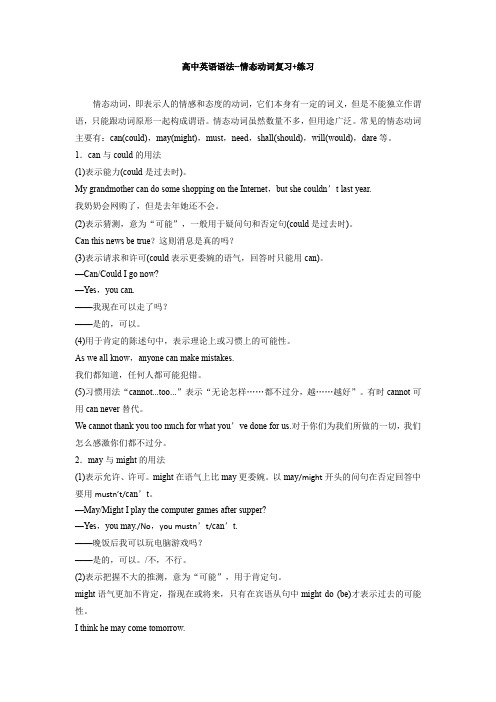
高中英语语法--情态动词复习+练习情态动词,即表示人的情感和态度的动词,它们本身有一定的词义,但是不能独立作谓语,只能跟动词原形一起构成谓语。
情态动词虽然数量不多,但用途广泛。
常见的情态动词主要有:can(could),may(might),must,need,shall(should),will(would),dare等。
1.can与could的用法(1)表示能力(could是过去时)。
My grandmother can do some shopping on the Internet,but she couldn’t last year.我奶奶会网购了,但是去年她还不会。
(2)表示猜测,意为“可能”,一般用于疑问句和否定句(could是过去时)。
Can this news be true?这则消息是真的吗?(3)表示请求和许可(could表示更委婉的语气,回答时只能用can)。
—Can/Could I go now?—Yes,you can.——我现在可以走了吗?——是的,可以。
(4)用于肯定的陈述句中,表示理论上或习惯上的可能性。
As we all know,anyone can make mistakes.我们都知道,任何人都可能犯错。
(5)习惯用法“cannot...too...”表示“无论怎样……都不过分,越……越好”。
有时cannot可用can never替代。
We cannot thank you too much for what you’ve done for us.对于你们为我们所做的一切,我们怎么感激你们都不过分。
2.may与might的用法(1)表示允许、许可。
might在语气上比may更委婉。
以may/might开头的问句在否定回答中要用mustn’t/can’t。
—May/Might I play the computer games after supper?—Yes,you may./No,you mustn’t/can’t.——晚饭后我可以玩电脑游戏吗?——是的,可以。
15 情态动词-高中英语语法记忆框架版(精编)
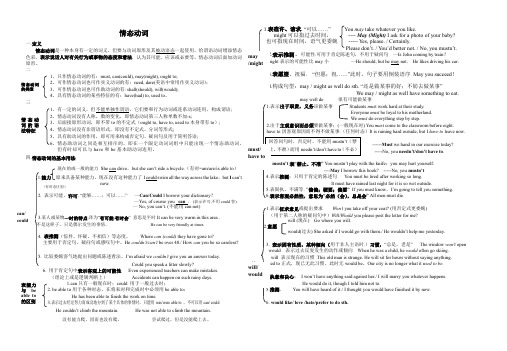
情态动词一.定义情态动词是一种本身有一定的词义,但要与动词原形及其被动语态一起使用,给谓语动词增添情态色彩,表示说话人对有关行为或事物的态度和看法,认为其可能、应该或必要等。
情态动词后面加动词原形。
二1、只作情态动词的有:must, can(could), may(might), ought to;2、可作情态动词也可作实义动词的有:need, dare(美语中常用作实义动词);3、可作情态动词也可作助动词的有: shall(should), will(would);4、具有情态动词的某些特征的有:have(had) to, used to 。
三1、有一定的词义,但不能单独作谓语,它们要和行为动词或连系动词连用,构成谓语;2、情态动词没有人称,数的变化,即情态动词第三人称单数不加-s;3、后面接原形动词,即不带to的不定式(ought to, have to, used to 本身带有to );4、情态动词没有非谓语形式,即没有不定式、分词等形式;5、具有助动词的作用,即可用来构成否定句、疑问句及用于简明答语;6但有时却可以与have 和be 基本助动词连用。
四.情态动词的基本用法She can drive ,but she can’t ride a bicycle.(有时=am/are/is able to ) I could swim all the way across the lake ,but I can’tnow. . “能够……;可以……” —Can/Could I borrow your dictionary ? —Yes, of course you can .(表示许可,不用could 答) — No, you can’t. (不能用can not) ,译为“有可能,有时会” 意思是平时It can be very warm in this area .。
He can be very friendly at times.Where can (could) they have gone to? He couldn’t/can’t be over 40./ How can you be so careless? I’m afraid we couldn’t give you an answer today. Could you speak a litter slowly?6. 用于肯定句中表示客观上的可能性 Even experienced teachers can make mistakes.(理论上或是逻辑判断上) Accidents can happen on such rainy days.1.can 只有一般现在时;could 用于一般过去时;2. be able to 用于各种时态,在将来时和完成时中必须用be able to ; He has been able to finish the work on time.3.表示过去经过努力而成功地办到了某个具体的事情时,只能用was/were able to ,不可以用can/ could He couldn’t climb the mountain. He was not able to climb the mountain.. “可以……” You may take whatever you like.might 可以指过去时间, ---- May (Might) I ask for a photo of your baby?----- Yes, please. / Certainly.Please don’t. / You’d better not. / No, you mustn’t.表示推测.,可能性.可用于肯定陈述句,不用于疑问句 —Is John coming by train ? 表示的可能性比may 小 —He should, but he may not . He likes driving his car . 表愿望、祝福. “但愿;祝……”此时,句子要用倒装语序 May you succeed !构成句型:may / might as well do sth. “还是做某事的好;不妨去做某事” We may / might as well have something to eat. may well do 很有可能做某事mus t work hard at their study.must be loyal to his motherland.do everything step by step. ) You must come to the classroom before eight. It is raining hard outside, but I have to leave now. ------Must we hand in our exercise today?-----No, you needn’t/don’t have to . ;you may hurt yourself.-----No, you mustn’t,I’m going to tell you something. ” All men must die.征求意见或提出要求 Won’t you take off your coat? (用否定式更委婉) Will/Would you please post the letter for me?will (现在) Go where you will.would(过去) She asked if I would go with them./ He wouldn’t help me yesterday. 表示固有性质,某种倾向(用于非人主语时.)习惯,“总是,老是” The window won't open 表示过去反复发生的动作或倾向 When he was a child, he would often go skiing. will 表示现在的习惯 This old man is strange. He will sit for hours without saying anything.正式,现已无此习惯。
高中英语语法系统讲解之八情态动词和虚拟语气
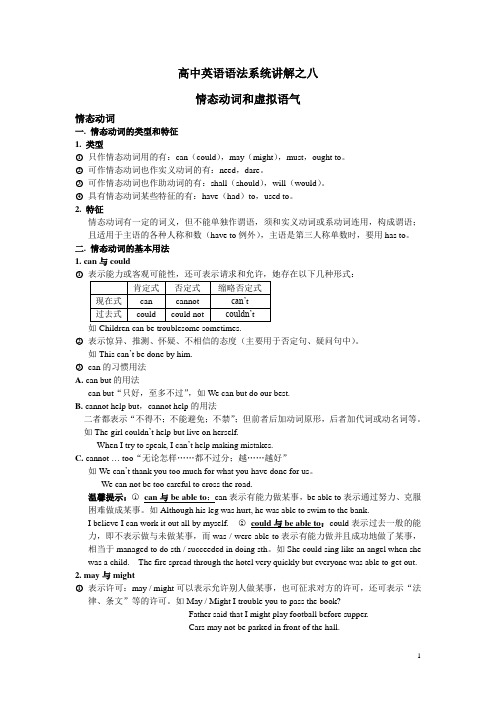
高中英语语法系统讲解之八情态动词和虚拟语气情态动词一. 情态动词的类型和特征1. 类型○1只作情态动词用的有:can(could),may(might),must,ought to。
○2可作情态动词也作实义动词的有:need,dare。
○3可作情态动词也作助动词的有:shall(should),will(would)。
○4具有情态动词某些特征的有:have(had)to,used to。
2. 特征情态动词有一定的词义,但不能单独作谓语,须和实义动词或系动词连用,构成谓语;且适用于主语的各种人称和数(have to例外),主语是第三人称单数时,要用has to。
二. 情态动词的基本用法1. can与could○1○2表示惊异、推测、怀疑、不相信的态度(主要用于否定句、疑问句中)。
如This can’t be done by him.○3can的习惯用法A. can but的用法can but“只好,至多不过”,如We can but do our best.B. cannot help but,cannot help的用法二者都表示“不得不;不能避免;不禁”;但前者后加动词原形,后者加代词或动名词等。
如The girl couldn’t help but live on herself.When I try to speak, I can’t help making mistakes.C. cannot … too“无论怎样……都不过分;越……越好”如We can’t thank you too much for what you have done for us。
We can not be too careful to cross the road.温馨提示:○1can与be able to:can表示有能力做某事,be able to表示通过努力、克服困难做成某事。
如Although his leg was hurt, he was able to swim to the bank.I believe I can work it out all by myself. ○2could与be able to:could表示过去一般的能力,即不表示做与未做某事,而was / were able to表示有能力做并且成功地做了某事,相当于managed to do sth / succeeded in doing sth。
高中英语语法之情态动词
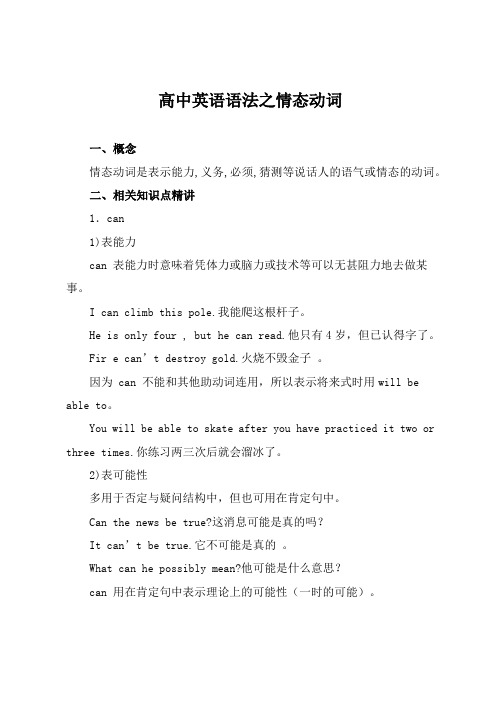
高中英语语法之情态动词一、概念情态动词是表示能力,义务,必须,猜测等说话人的语气或情态的动词。
二、相关知识点精讲1.can1)表能力can 表能力时意味着凭体力或脑力或技术等可以无甚阻力地去做某事。
I can climb this pole.我能爬这根杆子。
He is only four , but he can read.他只有4岁,但已认得字了。
Fir e can’t destroy gold.火烧不毁金子。
因为 can 不能和其他助动词连用,所以表示将来式时用will be able to。
You will be able to skate after you have practiced it two or three times.你练习两三次后就会溜冰了。
2)表可能性多用于否定与疑问结构中,但也可用在肯定句中。
Can the news be true?这消息可能是真的吗?It can’t be true.它不可能是真的。
What can he possibly mean?他可能是什么意思?can 用在肯定句中表示理论上的可能性(一时的可能)。
Attending the ball can be very exciting.The road can be blocked.这条路可能会不通的。
may 在肯定句中表示现实的可能性。
The road may be blocked.这条路可能不通了。
3)表示允许(和 may 意思相近)常见于口语。
Can (May) I come in ?我能进来吗?Can I smoke here ?我可以在这里抽烟吗?2.could 的用法1)表过去的可能和许可,(多用于间接引语中)At that time we thought the story could not be true.那时我们认为所说的事不可能是真的。
Father said I could swim in the river.爸爸说我可以在河里游泳。
高中英语2025届高考语法复习情态动词与虚拟语气知识讲解
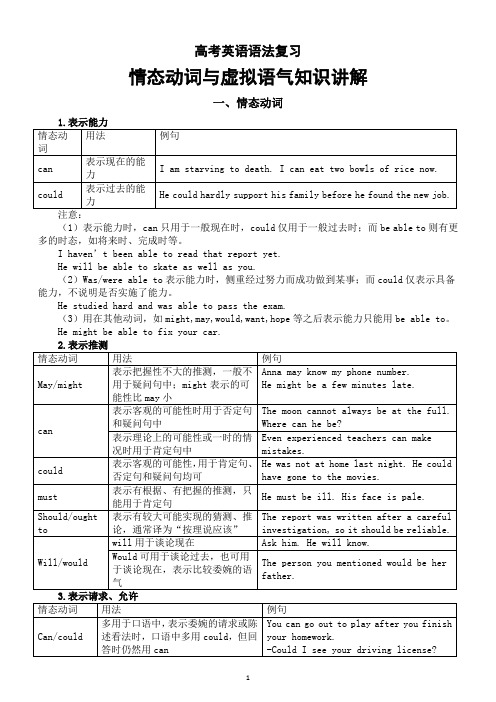
高考英语语法复习情态动词与虚拟语气知识讲解一、情态动词(1)表示能力时,can只用于一般现在时,could仅用于一般过去时;而be able to则有更多的时态,如将来时、完成时等。
I haven’t been able to read that report yet.He will be able to skate as well as you.(2)Was/were able to表示能力时,侧重经过努力而成功做到某事;而could仅表示具备能力,不说明是否实施了能力。
He studied hard and was able to pass the exam.(3)用在其他动词,如might,may,would,want,hope等之后表示能力只能用be able to。
He might be able to fix your car.(1)must还可以表示质问或感情色彩,意为“偏要,偏偏”。
Why must it snow on Saturday?(2)should还可以表示惊奇、愤怒、失望等特殊情感,尤其用在以why,who,how等开头的疑问句中或某些感叹句中。
why should you be so late today?(1)must作“必须”讲的一般疑问句,其肯定回答用must,否定回答用needn’t或don’t have to。
-Must I pay now?-Yes, you must./No, you needn’t.(2)need还可以作实义动词,有人称和数的变化,后跟带to的不定式作宾语。
She needed to go out for a walk.(1)两者在表示过去的习惯动作或行为时常可通用。
When we were children, we would/used to go skating every winter.(2)Used to与would都不能与表示具体频率、次数的词及特定的时间状语或具体的一段时间连用。
高中英语语法-情态动词

➢ will/would 表示意愿 二者均表示自愿做或主动提出做什么,如意志、愿望或决心等, would用于表示过去去的情况 They would not let him in because he was poorly dressed. 他们不让他进去,因为他衣服破旧。 表示请求 二者均用于主语是第二人称的问句中, 表示请求。would比will更客 气、委婉,不表示过去意义。
shall 的用法 1.用于第一、 三人称作主语的疑问句中,表示说话人征求对方的意见 或请求 2.用于第二、三人称作主语的陈述句中,表示说话人给对方的许诺、 命令、警告等 3.用于第三人称作主语的陈述句中,表示条约、规定、法令等文件中 的义务或规定
should的用法 1.作为shall的过去式,用于第一、三人称作主语的疑问句转化而成的 间接引语中,以征求对方的意见 2.表示义务职责等,意为“应该” 3.表示说话人的惊奇:愤怒、失望等特殊情感
Can的习惯用法 1.表示气愤或者惊讶,一般用于疑问句和否定句,意为 “怎么可以…;难道会….” 2.Can but 表示“只好;至多不过” 3.Cannot help but do , cannot help doing sth . 表示“禁不 住做…,不能停止做” 4.Cannot…too…表示“无论….都不过分,越….越好”。有 时cannot可用can never 代替
后接完成进行式
They should have ben painting the new bouse. Both husband and wife took leave . 想必他们一 直在粉刷新房子。夫妇两人都请假了。
Don’t ask me . How should I know? 不要问我,我怎么会知道呢?
高中英语语法情态动词
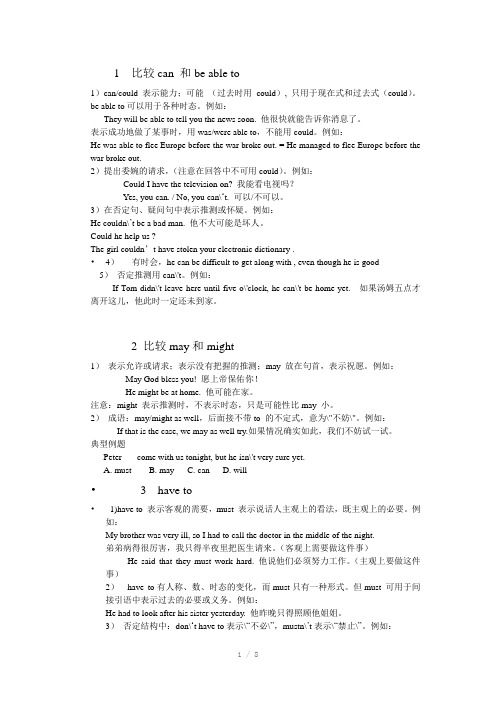
1 比较can 和be able to1)can/could 表示能力;可能(过去时用could), 只用于现在式和过去式(could)。
be able to可以用于各种时态。
例如:They will be able to tell you the news soon. 他很快就能告诉你消息了。
表示成功地做了某事时,用was/were able to,不能用could。
例如:He was able to flee Europe before the war broke out. = He managed to flee Europe before the war broke out.2)提出委婉的请求,(注意在回答中不可用could)。
例如:--- Could I have the television on? 我能看电视吗?--- Yes, you can. / No, you can\‘t. 可以/不可以。
3)在否定句、疑问句中表示推测或怀疑。
例如:He couldn\’t be a bad man. 他不大可能是坏人。
Could he help us ?The girl couldn’t have stolen your electronic dictionary .•4)有时会,he can be difficult to get along with , even though he is good 5)否定推测用can\'t。
例如:If Tom didn\'t leave here until five o\'clock, he can\'t be home yet.如果汤姆五点才离开这儿,他此时一定还未到家。
2 比较may和might1)表示允许或请求;表示没有把握的推测;may 放在句首,表示祝愿。
例如:May God bless you! 愿上帝保佑你!He might be at home. 他可能在家。
高中英语必修二Unit1语法及词汇总结
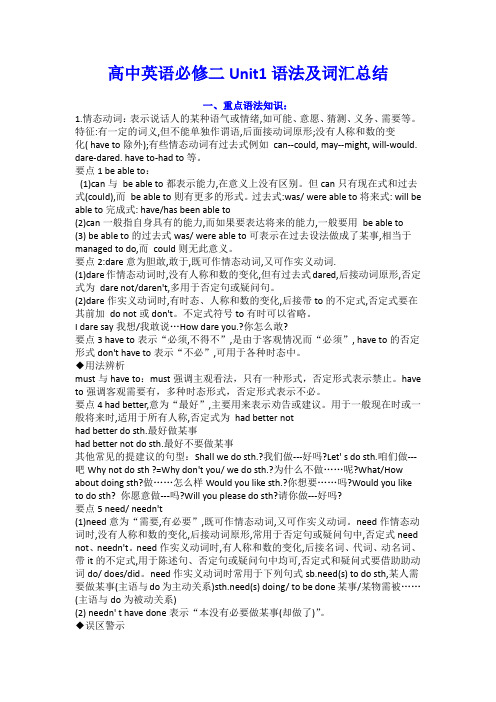
高中英语必修二Unit1语法及词汇总结一、重点语法知识:1.情态动词:表示说话人的某种语气或情绪,如可能、意愿、猜测、义务、需要等。
特征:有一定的词义,但不能单独作谓语,后面接动词原形;没有人称和数的变化( have to除外);有些情态动词有过去式例如can--could, may--might, will-would. dare-dared. have to-had to等。
要点1 be able to:(1)can与be able to都表示能力,在意义上没有区别。
但can只有现在式和过去式(could),而be able to则有更多的形式。
过去式:was/ were able to将来式: will be able to完成式: have/has been able to(2)can一般指自身具有的能力,而如果要表达将来的能力,一般要用be able to(3) be able to的过去式was/ were able to可表示在过去设法做成了某事,相当于managed to do,而could则无此意义。
要点2:dare意为胆敢,敢于,既可作情态动词,又可作实义动词.(1)dare作情态动词时,没有人称和数的变化,但有过去式dared,后接动词原形,否定式为dare not/daren't,多用于否定句或疑问句。
(2)dare作实义动词时,有时态、人称和数的变化,后接带to的不定式,否定式要在其前加do not或don't。
不定式符号to有时可以省略。
I dare say我想/我敢说…How dare you.?你怎么敢?要点3 have to表示“必须,不得不”,是由于客观情况而“必须”, have to的否定形式don't have to表示“不必”,可用于各种时态中。
◆用法辨析must与have to:must强调主观看法,只有一种形式,否定形式表示禁止。
高一英语语法-情态动词
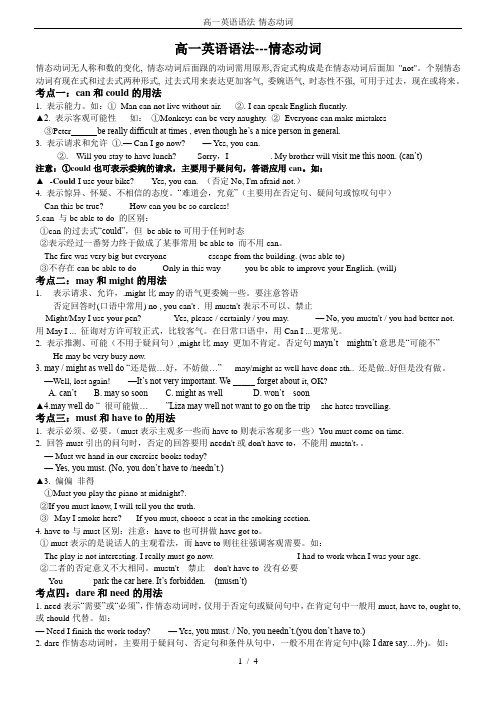
高一英语语法---情态动词情态动词无人称和数的变化, 情态动词后面跟的动词需用原形,否定式构成是在情态动词后面加"not"。
个别情态动词有现在式和过去式两种形式, 过去式用来表达更加客气, 委婉语气, 时态性不强, 可用于过去,现在或将来。
考点一:can和could的用法1. 表示能力。
如:①Man can not live without air. ②. I can speak English fluently.▲2. 表示客观可能性如:①Monkeys can be very naughty. ②Everyone can make mistakes③Peter be really difficult at times , even though he’s a nice person in general.3. 表示请求和允许①.— Can I go now? — Yes, you can.②. --Will you stay to have lunch? -- Sorry,I _________. My brother will visit me this noon. (can’t)注意:①could也可表示委婉的请求,主要用于疑问句,答语应用can。
如:▲---Could I use your bike? ---Yes, you can. (否定No, I'm afraid not.)4. 表示惊异、怀疑、不相信的态度。
“难道会,究竟”(主要用在否定句、疑问句或惊叹句中)Can this be true? How can you be so careless!5.can 与be able to do 的区别:①can的过去式“could”,但be able to可用于任何时态②表示经过一番努力终于做成了某事常用be able to 而不用can。
The fire was very big but everyone _________escape from the building. (was able to)③不存在can be able to do Only in this way _____you be able to improve your English. (will)考点二:may和might的用法1.表示请求、允许,.might比may的语气更委婉一些。
- 1、下载文档前请自行甄别文档内容的完整性,平台不提供额外的编辑、内容补充、找答案等附加服务。
- 2、"仅部分预览"的文档,不可在线预览部分如存在完整性等问题,可反馈申请退款(可完整预览的文档不适用该条件!)。
- 3、如文档侵犯您的权益,请联系客服反馈,我们会尽快为您处理(人工客服工作时间:9:00-18:30)。
高中英语语法之情态动词(一)情态动词的定义 :情态动词表示说话人对某一动作或状态的态度。
(二)情态动词的特点 :1)有一定词义;2)不受主语人称和数的变化影响;3)与主要动词的原形(或称不带to的不定式)一起构成谓语(除ought to作固定词组看待)。
情态动词无人称和数的变化, 情态动词后面跟的动词需用原形,否定式构成是在情态动词后面加"not"。
个别情态动词有现在式和过去式两种形式, 过去式用来表达更加客气, 委婉的语气, 时态性不强, 可用于过去,现在或将来。
(三)情态动词的基本用法1. can (could)1)表示水平,could主要指过去时间。
Two eyes can see more than one. 两只眼比一只眼看得清。
Could the girl read before she went to school? 这女孩上学前能识字吗?2)表示可能(理论上或是逻辑判断上)。
The temperature can fall to –60℃, that is 60℃ below freezing.气温可降至—60℃,也就是零下60℃。
He can´t (couldn´t) have enough money for a new car. 他不可能有充足的钱买新车。
You mustn´t smoke while you´re walking around in the wood. You could start a fire.在林子里走时勿吸烟,那样可能会引起火灾。
3)表示允许。
Can I have a look at your new pen? 我能够看一看你的新钢笔吗?He asked whether he could take the book out of the reading—room.他问他可不能够把书带出阅览室。
4)表惊异、怀疑、不相信等态度。
主要用于否定句、疑问句或感叹句中。
Where can (could) they have gone to? 他们会去哪儿了呢?He can´t (couldn´t) be over sixty. 他不可能超过六十岁。
How can you be so careless? 你怎么这么粗心?5)比较委婉客气地提出问题或陈述看法。
Can (Could) you lend me a hand? 帮我一把好吗?I´m afraid we couldn´t give you an answer today. 恐怕我们今天不能给你答复。
6)表示特定的某一过去水平或表示成功地做了某事时,只能用was/were able to,不能用could。
He was able to escape from Europe before the war broke out.He was able to swim before he got tired.2. may (might)1)表允许,might能够指过去时间,也可指现在时间,语气更委婉。
You may take whatever you like. 你喜欢什么就拿什么。
He told me that I might smoke in the room. 他告诉我能够在房间里抽烟。
May (Might) I ask for a photo of your baby? 我能够要一张你宝宝的照片吗?在回答以may引起的问句时,多避免用这个词,而用其它方式,如Yes, please. / Certainly./ Please don´t ./ You´d better not. / No, you mustn´t.等,以免显得太严峻或不客气。
2)表可能(事实上)。
能够指过去时间,也能够指现在时间,但语气更加不肯定。
He may be at home. 他可能在家。
She may not know about it. 她可能不知道这件事。
He was afraid they might not agree with him. 他担心他们可能不同意他的意见。
Your math teacher might be in his office,but I´m not sure. 他们有可能在开会,然而我不肯定。
3).有时能够用于祈使句表示祝愿。
eg.①May you succeed. 祝你成功②May you be happy. 祝你快乐。
③May that day come soon. 希望这个天早日到来。
4) may/might + as well的意义:此结构用于说明一个人在没有更好的或更有趣的事可做的情况下,或以某种不快的心情不得不做的事,是一种非正式的文体,常译成“还是…的好”。
eg. ① All the shops are closed; we may as well go back.② You might as well speak out your mind. 你还是把你的想法说出来吧。
3. must1)表示义务。
意为“必须”(主观意志)。
We must do everything step by step. 我们一切都必须循序渐进地做。
You mustn´t talk to her like that. 你不可能那样对她说话。
--Must we hand in our exercise—books now? 我们现在就要交练习本吗?--No, you needn´t. / No, you don´t have to. 不必。
2)表示揣测。
意为“想必、准是、一定”等,只用于肯定句。
He must be ill. He looks so pale. 他准是病了。
他的脸色苍白。
She´s wearing a diamond necklace. She must have a lot of money.她戴着钻石项链,一定很有钱。
3) If you must (do sth) (表示虽不赞同但可允许)如果你一定要那么做--Can I smoke ? --If you must.我可以抽烟吗?如果你一定要抽的话。
It’s from my boyfriend ,if you must know.假如你一定要知道的话,这是我男朋友给的。
4)must有时可用来表示“偏偏”的意思。
Why must it rain today? 为什么偏偏在今天下雨?--Must you interrupt now?--Can’t you see I’m on the phone. Sorry Sir ,but it’t urgent.4. shall1)表征询意见,用于第一、第三人称疑问句。
Shall I get you some tea? 我给你点茶好吗?Shall the boy wait outside? 让那男孩在外面等吗?What shall we do this evening? 我们今晚做什么?2)表说话人的意愿,有“命令、允诺、警告、决心”等意思,用于第二、第三人称陈述句。
You shall do as I say. 按我说的做。
(命令)You shall have my answer tomorrow. 你明天可以得到我的答复。
(允诺)He shall be sorry for it one day, I tell you. 有一天他会后悔的,我告诉你。
(警告)Nothing shall stop us from carrying out the plan. 什么也不能阻止我们执行这项计划(决心)5. should1)表义务。
意为“应该”,用于各种人称。
You should be polite to your teachers. 你对老师应该有礼貌。
You shouldn´t waste any time. 你不应该浪费时间。
2)表推测,意为“想必一定、照说应该、估计”等。
The film should be very good as it is starring first—class actors.这部新电影是一流演员主演的,估计拍得很好。
They should be home by now. 照说他们现在应当已经到家了。
3)Should 表示意外、惊讶等情绪,意为“居然,竟然”。
I find it astonishing that he should be so rude to you.他竟然对你这么无礼,真叫我吃惊。
It never occurred to me that she should lie to me again.6. will1)表意愿,用于各种人称陈述句。
I will do anything for you. 我愿为你做任何事。
None is so blind as those who won´t see. 不愿看的人眼最瞎。
If you will read the book, I´ll lend it to you. 如果你愿意读这本书,我会把它借给你。
2)表请求,用于疑问句。
Will you close the window? It´s a bit cold. 请你把窗户关上好吗?有点冷。
Won´t you drink some more coffee? 再来一点咖啡好吗?3)表示某种倾向或目前的习惯性动作。
Fish will die out of water. 鱼离开水就不能活。
The door won´t open. 这门打不开。
The boy will sit there hour after hour looking at the traffic go by.那男孩常常坐在那里好几个钟点,看着车辆行人通过7.would1)表意愿。
They would not let him in because he was poorly dressed. 他们不让他进去因为他衣着旧。
I said I would do anything for you. 我说过我愿意为你做任何事。
2)表委婉地提出请求、建议或看法。
Would you like another glass of beer? 再来杯啤酒好吗?Would you mind cleaning the window? 请把窗户擦一下好吗?They wouldn´t have anything against it. 他们不会有什么反对意见。
